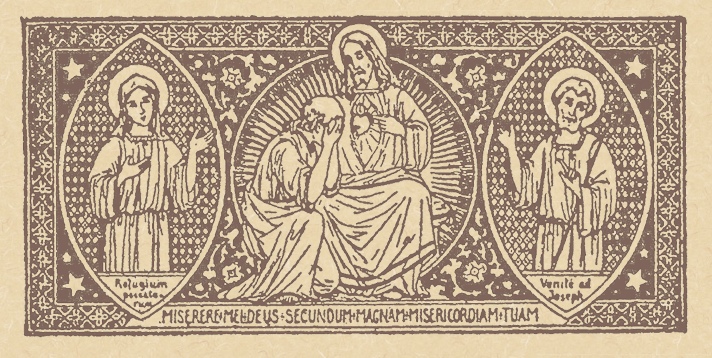Prudence 101: Occasions of Sin.
The Fourth Wednesday of Lent.*
Lessons from the feria, according to the ordinary form of the Roman Rite:
• Deuternonomy 4: 1, 5-9.
• Psalm 147: 12-13, 15-16, 19-20.
• Matthew 5: 17-19.
Lessons from the feria, according to the extraordinary form of the Roman Rite:
• Exodus 20: 12-24.
• [Gradual] Psalm 6: 3-4.
• [Tract] Psalm 102: 10.
• Matthew 15: 1-20.
The Fourth Wednesday of the Great Fast; Mid-Lent; and, the Feast of the Holy Martyr Basilides, Priest of Ancyra.**
Lessons for the Presanctified,*** according to the Ruthenian recension of the Byzantine Rite:
• Genesis 9: 18—10: 1.
• Proverbs 12: 23—13: 9.
FatherVenditti.com
|
 7:57 AM 3/22/2017 — Both lessons—from Deuteronomy and Matthew—remind us of the necessity of obeying the Commandments. Nothing earth-shattering in that. Perhaps we read these lessons today lest anyone become confused as a result of yesterday's lesson, in which our Lord cancels the Jewish ethic of an eye for an eye with his own, unyielding prescript about forgiveness. None of us should have walked away from that with the notion that the Commandments need not be obeyed; perhaps the Roman Missal just wants to make sure. 7:57 AM 3/22/2017 — Both lessons—from Deuteronomy and Matthew—remind us of the necessity of obeying the Commandments. Nothing earth-shattering in that. Perhaps we read these lessons today lest anyone become confused as a result of yesterday's lesson, in which our Lord cancels the Jewish ethic of an eye for an eye with his own, unyielding prescript about forgiveness. None of us should have walked away from that with the notion that the Commandments need not be obeyed; perhaps the Roman Missal just wants to make sure.
But tucked away in our Lord's little sermon today is the concept of the occasion of sin. In our Act of Contrition we routinely promise our Lord that we will avoid them, but we don't often consider how prevalent they can be, especially in this age of electronic communication and digital media. Avoiding occasions of sin requires forethought, and so often our sins are the result of having none.
Part of the problem is that occasions of sin are subjective: what's an occasion of sin for one person may not be for another. Our eating habits can serve as a good analogy here: I'm a diabetic, and I also have no stomach, having had much of those bits surgically removed; so, when someone puts a slice of double-fudge chocolate cake in front of me, it doesn't tempt me because I know from experience that even just one bite could make me violently ill for the rest of the day; but, someone else may find that slice of cake difficult to resist. In the same way, what's an occasion of sin for one person may not be for another. Another analogy: someone who is not an alcoholic can have a glass of wine with his meal with no consequences, but an alcoholic cannot because even just one sip could result in a binge that would lead to a relapse into drunkenness.
When our Blessed Lord, in his little homily today, says that “whoever breaks one of the least of these commandments and teaches others to do so will be called least in the Kingdom of heaven” (Matt. 5: 19 RM3), He's not talking about someone overtly going around saying, “Let me teach you to break the Commandments”; He's talking about how easy it is for us to—often unwittingly—place someone else in what's an occasion of sin for them, even it is isn't one for us. A text message of a risque nature, for example, may not have any effect on us, but sent to someone else could be an occasion of impurity for that person.
Remember the little Examination of Conscience cards I gave out one year in Lent and Advent? There's a question on there which asks us to consider whether we've done anything to lead someone else into an occasion of sin: that's because there are things we could say or do which may have no moral implications for us, but which could lead someone else into a temptation toward sin. How are we supposed to know what might be an occasion of sin for someone else? We can't. That's why our Lord is so forceful in His words today: when dealing with the souls of others, extreme caution and prudence is always indicated.
Let us ask our Lord today not only for the courage to avoid whatever may lead us into sin, but for an increase in the virtue of prudence, so that nothing we say or do could possibly be an occasion of sin for anyone we may meet along the way.

* Because Lent began on a Wednesday, today is the fourth Wednesday. Cf. the post here under the heading "Hey, aren't you off by a week?" for an explanation of how the days of the liturgical calendar are rendered on this site as opposed to how they are designated in the Roman Missal.
** Because the Great Fast began on a Monday, today is the fourth Wednesday.
In the Byzantine Tradition, the day known as Mid-Lent marks the exact half-way point between the first day of Lent (the Monday after Cheesefare Sunday) and Pascha. It is on this day that the litany for those about to be baptized begins to be chanted at services.
Basilides, sometimes called Basil, was martyred in 363 under Emperor Julian the Apostate.
*** Cf. the second footnote to the post here for an explanation of weekday services in the Byzantine Tradition during the Great Fast.
|

